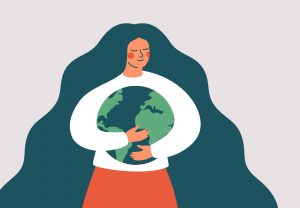Notice During the Covid-19 Outbreak
In solidarity, we at the Interfaith Peace Project stand together in these times of heart break and upset. Some of you may have lost friends or family members. Some of you may have lost your job and your income; some may be working overtime to help with the crisis. Some of you may be home and alone and some may be trying to figure out a new way to live. Please let us know how we can help. If you would like a phone appointment with any of us, give us a call.You may call or email Tom at:
____________________

© Mary Long stock.adobe.com
A Reflection from the Christian Traditions:
The Loving Care of One Another
by Thomas P. Bonacci, C.P.
This week marks the Fifth Anniversary of the prophetic Papal Encyclical, Laudato si’. This monumental work of Pope Francis faces the grim reality of the destruction of the environment. Francis appeals to the wisdom of worldwide faith leaders and the work of the scientific community. The work, dubbed the, “environmental encyclical,” is actually concerned with the well-being of the Planet as our “common home.” We are, as human persons, becoming more and more aware that we are a part of the environment. We are creatures of Earth. The Earth is our mother. The days of thinking that nature and the environment are outside ourselves are over. To care for the Earth is to treasure the lives and well-being of every living creature and person.
Francis proposes a powerful imagery for our consideration. We are called to live on Earth as members of a common family. We belong to the family of humankind. Simply, we live on Earth as our “common home.” As members living in a household have a responsibility to one another, so we who live on Earth have a common duty to provide a clean and heathy environment for the sake of one another.
It is fashionable in Interspiritual circles to say everything is interrelated, interconnected, and interdependent. Nothing helps us to realize this more than the air we breathe and the water we drink. Francis challenges the Nations of the World to reconsider how they live in this common home. In fact, the responsibility belongs to every person.
The Pope invites us to reconsider what we need, how we consume, and how we dispose of what is no longer useful. From this perspective, shopping, consuming, and disposing must be acts of justice by which no one is harmed and the Earth is cherished. Francis invites to seek the wisdom of Indigenous Peoples who have from times immortal lived in harmony with the forces of Nature. As Gandhi so wisely stated, “We must live simply so others may simply live.”
The pandemic now disrupting our normal routines is a harsh lesson in how dependent we are on one another. This is a perfect example of how self-care is care for another and care for another is self-care. The Covid-19 virus knows no boundaries. It is more than unfortunate that in some sectors the governmental leadership, or lack thereof, fosters the idea that personal freedom exempts us from caring for one another. Laudato si’ underscores the truth that ecological destruction first hurts the poor who are often deprived of their basic human rights. The poor and disenfranchised are suffering the impact of the pandemic in ways unimaginable. Since a peoples’ greatness is measured by how they treat their poor, this terrible pandemic is a rallying call and stark reminder that we live on Earth as members of one family – the human family. This is our common home and for it and one another we must care.
Thank you for all the times you watered the flowers, pick up the trash, advocated for the poor, blessed the children, and helped another person.


Off